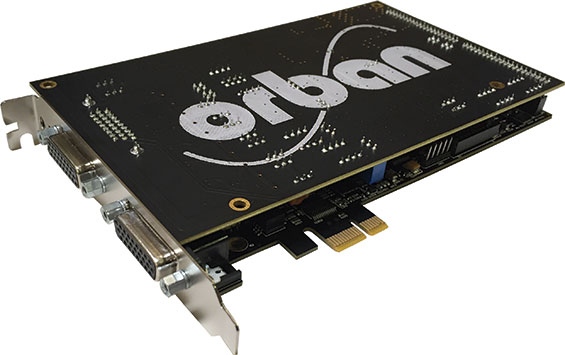- Overview
- Features
- Specifications
- [PDF] Brochure
- [FTP] Software/Docs

Optimod-FM 5501e: Overview
Orban’s 5501e is an FM stereo audio processor that provides the functionality of Orban’s stand-alone Optimod-FM 5500 on a PCIe card for PCs running Windows 7 or higher. It implements two-band and five-band processing, a stereo encoder with Orban’s Half-Cosine Interpolation composite limiter, and a low-latency monitor output. In addition to this classic Optimod-FM audio processing, the 5501e provides a BS.412 multiplex power controller to comply with European regulations.
Because the 5501e implements audio processing via onboard DSP chips, it uses few CPU resources. With a PCIe expansion chassis, one computer can run as many as eight 5501e cards.
Via a multi-pin connector on its rear flange, the 5501e offers a full complement of hardware inputs and outputs, both analog and AES3 digital. In addition to the usual left/right analog and AES3 digital inputs and outputs, the 5501e supplies two analog composite outputs and two analog SCA inputs. It has two sync inputs: AES11 sync, and wordclock / 10 MHz (automatically selected). These allow the 5501e’s output sample rate and pilot frequency to be locked to an external reference like GPS.
Additionally, the 5501e appears to Windows as a sound card that provides a Recording input and Playback output, so it can accept a left/right audio input and emit a processed L/R output through the normal Windows Sound mechanism. For example, a 5501e can directly accept the output of playout software that runs on the same computer. Moreover, integration with Windows Sound allows the 5501e to be interfaced to an audio-over-IP distribution system using an Ethernet port and audio-over-IP distribution driver on the host computer.
Like Orban’s popular 1101e audio processor / soundcard, the 5501e can be controlled via 5501e PC Remote software running on the same computer as the 5501e, or on a network. This software supports a connection list that can include multiple 5501e cards, so it can easily connect to a given card, whether local or in another computer on the network.
